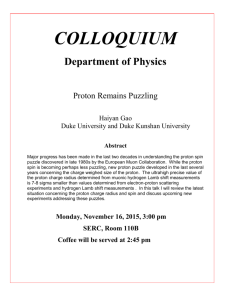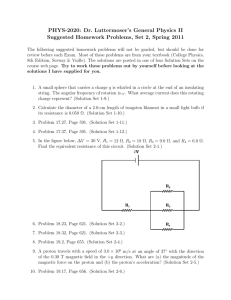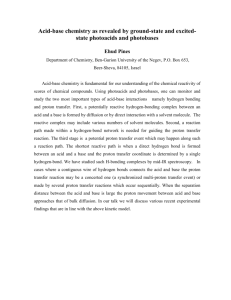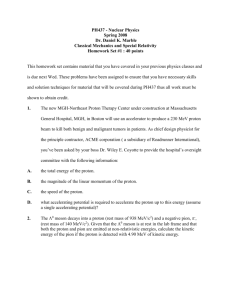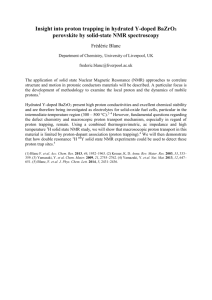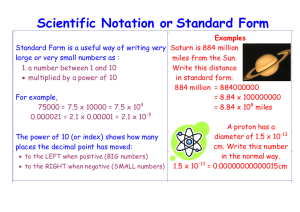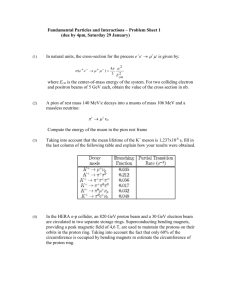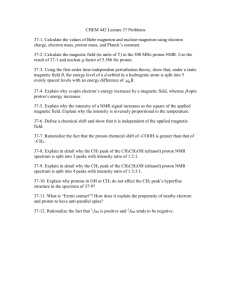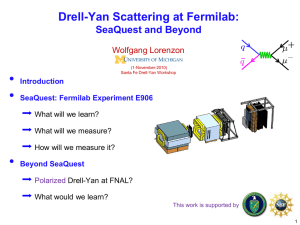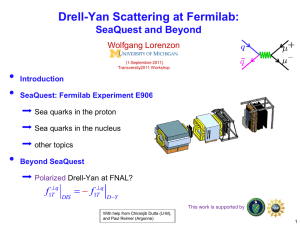What is the Proton?
advertisement
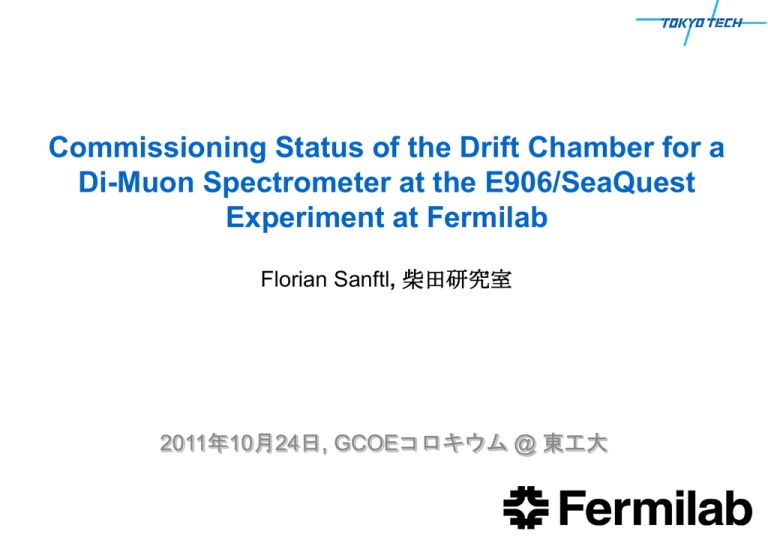
Commissioning Status of the Drift Chamber for a Di-Muon Spectrometer at the E906/SeaQuest Experiment at Fermilab Florian Sanftl, 柴田研究室 2011年10月24日, GCOEコロキウム @ 東工大 Outline 1) 2) 3) 4) Physics Motivation & Introduction E906/SeaQuest: Physics Goal Muon Pair Spectrometer Design and Commissioning of Drift Chamber built by Japanese Group 5) Track Reconstruction Algorithm / XT curve / position resolution of charged particles 6) Conclusion & Outlook 2011年10月24日 GCOEコロキウム @ 東工大 2 1) Physics Introduction & Motivation What is the Proton? Three “Valence” quarks Proton 2 “up” quarks (q = +⅔) 1 “down” quark (q = -⅓) Bound together by gluons Gluons can split into quarkantiquark pairs (similar to the photon splitting into a electronpositron pair) The Proton “Sea” is formed of quarks and antiquarks Sea-quarks Gluons e+ Photon 2011年10月24日 eGCOEコロキウム @ 東工大 3 Purpose of our Study Is ū = đ valid in the Proton? Is there a Flavor Asymmetry of Anti-quarks in the Proton? đ - ū ≠ 0? đ/ū ≠ 1? 2011年10月24日 GCOEコロキウム @ 東工大 4 How can we measure Sea-Quarks? Deep Inelastic Scattering (DIS) Drell-Yan Process 90° Rotation Proton / Beam Proton / Target Proton Electron beam scatters off a proton Electromagnetic interaction between electron and quark Comparing electron before and after interaction reveals information about the proton structure 2011年10月24日 Proton beam scatters off a proton Quark and anti-quarks annihilate into virtual photon Virtual photon decays into two muons Anti-quarks can be selected GCOEコロキウム @ 東工大 5 Importance of ‘Bjorken-x’ xB and Q2 Q2 : 4-momentum transferred squared (“virtuality of photon”) Q2 = -q2 = 2EeE’e(1+cosθl) Alternative way for Q2: Q2 also represents spatial resolution where proton is probed r = hc/Q = 0.2fm/Q[GeV] typically Q2 > 1GeV2, r < 0.2*10-15 m 2011年10月24日 GCOEコロキウム @ 東工大 Bjorken-x: xB = fractional momentum carried by the struck quark xB = pQUARK / pPROTON 0 ≤ xB ≤ 1 q(xB,Q2): probability to hit a quark with flavour q, xB and Q2 6 Experimental Results NA51 (Drell-Yan) NMC (Gottfried Sum Rule) E866/NuSea (Drell-Yan) đ-ū đ/ū ū≠đ Unknown effects apparently dilutes meson cloud effects at large-x 2011年10月24日 GCOEコロキウム @ 東工大 7 2) The E906/SeaQuest Experiment Old Experiment: Fermilab E866/NuSea 1H, 2H, and nuclear targets 800 GeV proton beam New Experiment: Fermilab E906/SeaQuest 1H, 2H, and nuclear targets 120 GeV proton Beam Higher Cross section and Less Background 50x statistics!! Main Injector 120 GeV Tevatron 800 GeV 2011年10月24日 GCOEコロキウム @ 東工大 8 Physics Goal E906/Drell-Yan will extend old measurements to xB values > 0.3 and reduce statistical uncertainty. 2011年10月24日 GCOEコロキウム @ 東工大 9 3) Muon Pair Spectrometer Station 3: NEW from Tokyo Tech Drawing: T. O’Connor and K. Bailey 2011年10月24日 GCOEコロキウム @ 東工大 10 Motivation: Re-do, Re-use & Re-cylce Expect to start collecting data this autumn! • • • • • • • • St. 4 Prop Tubes: Homeland Security via Los Alamos St. 3 & 4 Hodo PMT’s: E-866, HERMES, KTeV St. 1 & 2 Hodoscopes: HERMES St. 2 & 3Minus- tracking: E-866 St. 3: NEW from Japanese Collaborators St. 2 Support Structure: KTeV Target Flasks: E-866 Cables: KTeV • 2nd Magnet: KTeV Analysis Magnet • Hadron Absorber: Fermilab Rail Head??? • Solid Fe Magnet Coils: E-866 SM3 Magnet • Shielding blocks: old beamline (Fermilab Today) • Solid Fe Magnet Flux Return Iron: E-866 SM12 Magnet 2011年10月24日 GCOEコロキウム @ 東工大 11 Spectrometer Top View μ+ 25 m 2011年10月24日 GCOEコロキウム @ 東工大 12 4) Design of the New Drift Chamber μ+ / μGeneral Performance requirements • Detection Area: 1.6 m (vertical) x 2.2 m (horizontal) • 6 Active layers: U/U’ (+14°), X/X’ (0°), V/V’ (-14°) • Position resolution: < 400 μm per plane Gas Selection: • For now: Argon:CO2 (80:20) Cell Structure • Cell width & height 20 mm • Wire spacing 10 mm • Diameter sense wire (Au-W) 30 μm, others (Au-CuBe) 80 μm Performance Parameters • Gas-gain ~4.0E5 • Drift velocity 3-6 cm / μsec (Ar:CO2) 2011年10月24日 U GCOEコロキウム @ 東工大 U’ X X’ V V’ 13 Commissioning Timeline STATUS of Station 3+ DC June, 2009 Design completed Fabrication completed January, 2010 March, 2010 Transport to RIKEN Tests at RIKEN July, 2010 Transport to Fermilab Tests at Fermilab Now Installation & Setup in Spectrometer 2011年10月24日 GCOEコロキウム @ 東工大 14 5) Track Reconstruction Algorithm Cosmic Ray Reconstructed track Scintillator Measure time difference between trigger and Signal from Chamber Convert time to distance by simulation(GARFIELD) Reconstruct Track (5 layer based) Iteration 2-dim distribution Time vs. Distance Project distance distributions and fit for position resolution Extract new time to distance relation Projected distance Accepted Hits Scintillator We are measuring: • Coincidence between bottom and top scintillator caused by cosmic rays • Time difference between coincidence and signal from chamber 2011年10月24日 GCOEコロキウム @ 東工大 15 Results and Discussion XT extraction: • 1st Iteration • Extracted curve agrees well with input curve within uncertainties • Still too little statistics from the edge of cell Deviation simulation between measurement: • Green bands is width of the projections • Those are constant over a wide T range • Band corresponds to position resolution of 500μm • Tilting behavior due to statistical effects 2011年10月24日 GCOEコロキウム @ 東工大 16 6) Conclusion and Outlook • • • • • • E906/SeaQuest is a Drell-Yan experiment It measures the asymmetry of anti-quarks in the proton Tokyo Tech group designed and built and a new drift chamber We prepared a Track Reconstruction Algorithm Algorithm is working well We already achieved a position resolution of 500μm which is very close to the design value of 400μm • Improvement by more iterations • We are ready for the first beam in November 2011!!! 2011年10月24日 GCOEコロキウム @ 東工大 17 The E906 Collaboration Abilene Christian University Obiageli Akinbule Brandon Bowen Mandi Crowder Tyler Hague Donald Isenhower Ben Miller Rusty Towell Marissa Walker Shon Watson Ryan Wright Academia Sinica Wen-Chen Chang Yen-Chu Chen Shiu Shiuan-Hal Da-Shung Su Argonne National Laboratory John Arrington Don Geesaman* Kawtar Hafidi Roy Holt Harold Jackson David Potterveld Paul E. Reimer* Josh Rubin University of Colorado Joshua Braverman Ed Kinney Po-Ju Lin Colin West 2011年10月24日 Fermi National Accelerator Laboratory Chuck Brown David Christian University of Illinois Bryan Dannowitz Dan Jumper Bryan Kerns Naomi C.R Makins Jen-Chieh Peng KEK Shin'ya Sawada Ling-Tung University Ting-Hua Chang Los Alamos National Laboratory Gerry Garvey Mike Leitch Han Liu Ming Xiong Liu Pat McGaughey University of Maryland Prabin Adhikari Betsy Beise Kaz Nakahara University of Michigan Brian Ball Wolfgang Lorenzon Richard Raymond National Kaohsiung Normal University Rurngsheng Guo Su-Yin Wang GCOEコロキウム @ 東工大 RIKEN Yuji Goto Atsushi Taketani Yoshinori Fukao Manabu Togawa Rutgers University Lamiaa El Fassi Ron Gilman Ron Ransome Elaine Schulte Brian Tice Ryan Thorpe Yawei Zhang Texas A & M University Carl Gagliardi Robert Tribble Thomas Jefferson National Accelerator Facility Dave Gaskell Patricia Solvignon Tokyo Institute of Technology Toshi-Aki Shibata Kenichi Nakano Florian Sanftl Shintaro Takeuchi Shou Miyasaka Yamagata University Yoshiyuki Miyachi 18 Flavor Asymmetry: Models Pauli Blocking: Excess of up-quarks permits creation of up-anti-up-pairs Meson Cloud in the nucleon—Sullivan process in DIS Antiquarks in spin 0 object → No net spin Chiral Quark models—effective Lagrangians LALP98-56 Instantons Statistical Parton Distributions 2011年10月24日 GCOEコロキウム @ 東工大 19
